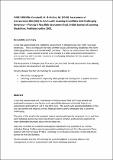Files in this item
Assessment of interpersonal risk (AIR) in adults with learning disabilities and challenging behaviour – piloting a new risk assessment tool
Item metadata
| dc.contributor.author | Campbell, Martin | |
| dc.contributor.author | McCue, Michael | |
| dc.date.accessioned | 2013-03-07T16:01:06Z | |
| dc.date.available | 2013-03-07T16:01:06Z | |
| dc.date.issued | 2012 | |
| dc.identifier | 17118198 | |
| dc.identifier | d5e49422-8c38-4656-9462-c0c894fd467b | |
| dc.identifier | 84877920431 | |
| dc.identifier.citation | Campbell , M & McCue , M 2012 , ' Assessment of interpersonal risk (AIR) in adults with learning disabilities and challenging behaviour – piloting a new risk assessment tool ' , British Journal of Learning Disabilities , vol. Early View . https://doi.org/10.1111/j.1468-3156.2012.00735.x | en |
| dc.identifier.issn | 1354-4187 | |
| dc.identifier.uri | https://hdl.handle.net/10023/3379 | |
| dc.description | This article is a report on a research project funded by the Knowledge Transfer Partnership. This research was a joint project with NHS Fife. The accelerated long-stay Learning Disability Hospital closure programme in Scotland throughout the late 1990s and from 2000 onwards, resulted in the movement of residents both within and out-with these Hospitals to either community based housing models or to community based In-patient services. The legacy and impact of this residential service re-provision was that individuals experienced changes in those they lived with, and those who supported them. This process took place against the back-drop and dynamic of associated changes in environmental, procedural, situational and interpersonal risk. It was in recognition of the challenge that this change programme presented to care services in terms of defensible risk assessment and management that the Assessment of Interpersonal Risk tool was developed. | en |
| dc.description.abstract | A new risk assessment tool, Assessment of Interpersonal Risk (AIR), was piloted and evaluated to measure risk factors and compatibility between individuals living in an assessment and treatment unit in one NHS area. The adults with learning disabilities in this unit had severe and enduring mental health problems and/or behaviour that is severely challenging. The aims of this small-scale research project were to estimate the reciprocal risk to and from each individual across five main risk domains and to enhance professional judgement to make defensible decisions about interpersonal risk. Data were recorded on incidents involving five individuals over a period of 6 months. Individual Rating Profiles were incorporated into existing Individual Risk Management Plans, together with interpersonal profiles, recording risk evaluations between named individuals across the five risk domains. Results showed that the AIR tool may be a useful addition to existing effective risk management, to inform assessments and future discharge planning. | |
| dc.format.extent | 10 | |
| dc.format.extent | 140221 | |
| dc.language.iso | eng | |
| dc.relation.ispartof | British Journal of Learning Disabilities | en |
| dc.rights | This is the preprint version of the following article: Campbell, M. and McCue, M. (2012), Assessment of interpersonal risk (AIR) in adults with learning disabilities and challenging behaviour – piloting a new risk assessment tool. British Journal of Learning Disabilities, which has been published in final form at doi: 10.1111/j.1468-3156.2012.00735.x | en |
| dc.subject | Risk assessment | en |
| dc.subject | Intellectual disabilities | en |
| dc.subject | Challenging behaviour | en |
| dc.subject | HV Social pathology. Social and public welfare | en |
| dc.subject | SDG 3 - Good Health and Well-being | en |
| dc.subject.lcc | HV | en |
| dc.title | Assessment of interpersonal risk (AIR) in adults with learning disabilities and challenging behaviour – piloting a new risk assessment tool | en |
| dc.type | Journal article | en |
| dc.contributor.institution | University of St Andrews.School of Psychology and Neuroscience | en |
| dc.identifier.doi | 10.1111/j.1468-3156.2012.00735.x | |
| dc.description.status | Peer reviewed | en |
| dc.identifier.url | http://www.ktponline.org.uk/ | en |
This item appears in the following Collection(s)
Items in the St Andrews Research Repository are protected by copyright, with all rights reserved, unless otherwise indicated.

